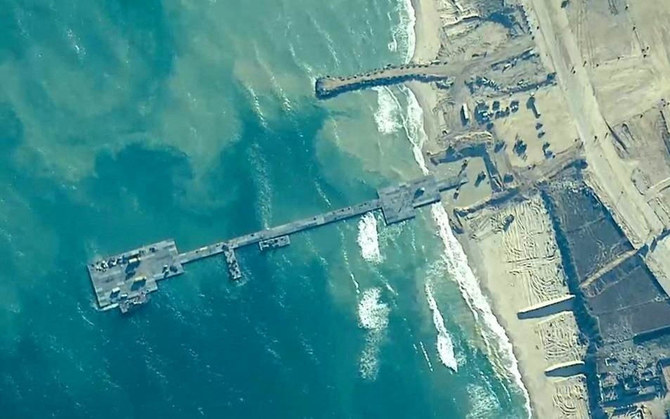WASHINGTON: Trucks carrying badly needed aid for the Gaza Strip rolled across a newly built US floating pier into the besieged enclave for the first time Friday as Israeli restrictions on border crossings and heavy fighting hinder food and other supplies reaching people there.
The US military’s Central Command acknowledged the aid movement in a statement Friday, saying the first aid crossed into Gaza at 9 a.m. It said no American troops went ashore in the operation.
“This is an ongoing, multinational effort to deliver additional aid to Palestinian civilians in Gaza via a maritime corridor that is entirely humanitarian in nature, and will involve aid commodities donated by a number of countries and humanitarian organizations,” the command said.
The shipment is the first in an operation that American military officials anticipate could scale up to 150 truckloads a day entering the Gaza Strip as Israel presses in on the southern city of Rafah as its 7-month offensive against Gaza.
But the US and aid groups also warn that the pier project is not considered a substitute for land deliveries that could bring in all the food, water and fuel needed in Gaza. Before the war, more than 500 truckloads entered Gaza on an average day.
The operation’s success also remains tenuous due to the risk of militant attack, logistical hurdles and a growing shortage of fuel for the trucks to run due to the Israeli blockade of the Gaza Strip since Oct. 7. Israel’s offensive since then has killed more than 35,000 Palestinians in the Gaza Strip, local health officials say, while hundreds more have been killed in the West Bank.
Troops finished installing the floating pier on Thursday. Hours later, the Pentagon said that humanitarian aid would soon begin flowing and that no backups were expected in the distribution process, which is being coordinated by the United Nations.
The UN, however, said fuel deliveries brought through land routes have all but stopped and this will make it extremely difficult to bring the aid to Gaza’s people.
“We desperately need fuel,” UN deputy spokesperson Farhan Haq said. “It doesn’t matter how the aid comes, whether it’s by sea or whether by land, without fuel, aid won’t get to the people.”
Pentagon spokesperson Sabrina Singh said the issue of fuel deliveries comes up in all US conversations with the Israelis. She also said the plan is to begin slowly with the sea route and ramp up the truck deliveries over time as they work the kinks out of the system.
Aid agencies say they are running out of food in southern Gaza and fuel is dwindling, while the US Agency for International Development and the World Food Program say famine has taken hold in Gaza’s north.
Israel asserts it places no limits on the entry of humanitarian aid and blames the UN for delays in distributing goods entering Gaza. The UN says fighting, Israeli fire and chaotic security conditions have hindered delivery.
Under pressure from the US, Israel has in recent weeks opened a pair of crossings to deliver aid into hard-hit northern Gaza and said that a series of Hamas attacks on the main crossing, Kerem Shalom, have disrupted the flow of goods. There’s also been violent protests by Israelis disrupting aid shipments.
US President Joe Biden ordered the pier project, expected to cost $320 million. The boatloads of aid will be deposited at a port facility built by the Israelis just southwest of Gaza City and then distributed by aid groups.
US officials said the initial shipment totaled as much as 500 tons of aid. The US has closely coordinated with Israel on how to protect the ships and personnel working on the beach.
But there are still questions on how aid groups will safely operate in Gaza to distribute food, said Sonali Korde, assistant to the administrator of USAID’s Bureau for Humanitarian Assistance, which is helping with logistics.
“There is a very insecure operating environment” and aid groups are still struggling to get clearance for their planned movements in Gaza, Korde said.
The fear follows an Israeli strike last month that killed seven relief workers from World Central Kitchen whose trip had been coordinated with Israeli officials and the deaths of other aid personnel during the war.
Pentagon officials have made it clear that security conditions will be monitored closely and could prompt a shutdown of the maritime route, even just temporarily. Navy Vice Adm. Brad Cooper, a deputy commander at the US military’s Central Command, told reporters Thursday that “we are confident in the ability of this security arrangement to protect those involved.”
Already, the site has been targeted by mortar fire during its construction, and Hamas has threatened to target any foreign forces who “occupy” the Gaza Strip.
Biden has made it clear that there will be no US forces on the ground in Gaza, so third-country contractors will drive the trucks onto the shore. Cooper said “the United Nations will receive the aid and coordinate its distribution into Gaza.”
The World Food Program will be the UN agency handling the aid, officials said.
Israeli forces are in charge of security on shore, but there are also two US Navy warships nearby that can protect US troops and others.
The aid for the sea route is collected and inspected in Cyprus, then loaded onto ships and taken about 200 miles (320 kilometers) to a large floating pier built by the US off the Gaza coast. There, the pallets are transferred onto the trucks that then drive onto the Army boats. Once the trucks drop off the aid on shore, they immediately turn around the return to the boats.




























